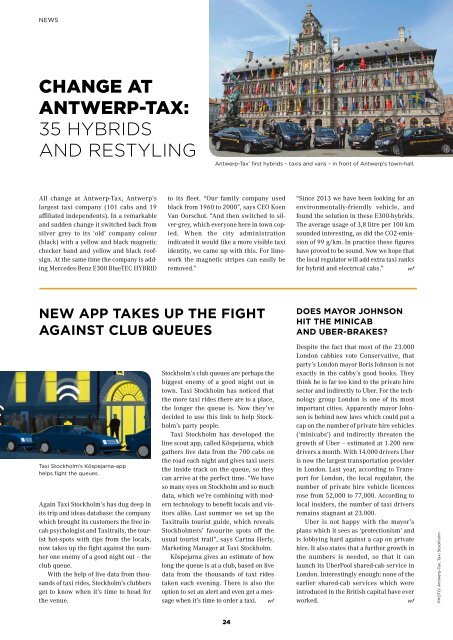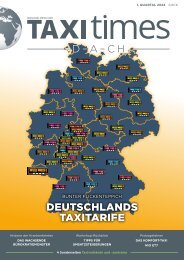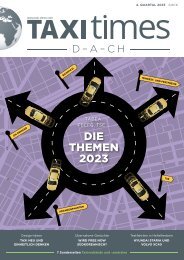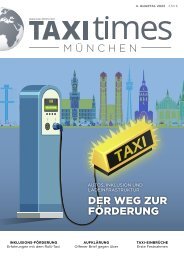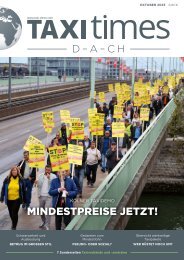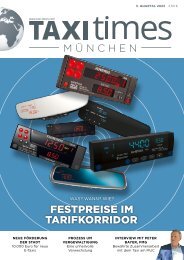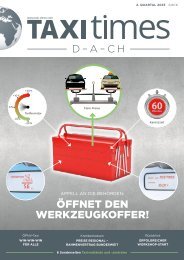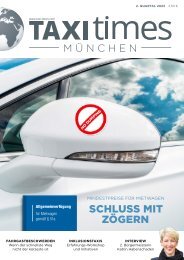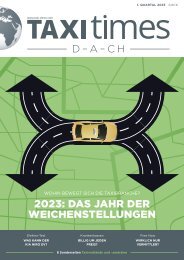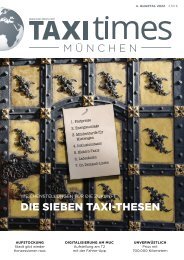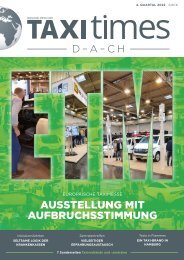You also want an ePaper? Increase the reach of your titles
YUMPU automatically turns print PDFs into web optimized ePapers that Google loves.
NEWS<br />
GUEST COMMENTARY<br />
CHANGE AT<br />
ANTWERP-TAX:<br />
35 HYBRIDS<br />
AND RESTYLING<br />
All change at Antwerp-Tax, Antwerp’s<br />
largest taxi company (101 cabs and 19<br />
affiliated independents). In a remarkable<br />
and sudden change it switched back from<br />
silver grey to its ‘old’ company colour<br />
(black) with a yellow and black magnetic<br />
checker band and yellow and black roofsign.<br />
At the same time the company is adding<br />
Mercedes-Benz E300 BlueTEC HYBRID<br />
to its fleet. “Our family company used<br />
black from 1960 to 2000”, says CEO Koen<br />
Van Oorschot. “And then switched to silver-grey,<br />
which everyone here in town copied.<br />
When the city administration<br />
indicated it would like a more visible taxi<br />
identity, we came up with this. For limowork<br />
the magnetic stripes can easily be<br />
removed.”<br />
NEW APP TAKES UP THE FIGHT<br />
AGAINST CLUB QUEUES<br />
Antwerp-Tax’ first hybrids – taxis and vans – in front of Antwerp’s town-hall.<br />
“Since 2013 we have been looking for an<br />
environmentally-friendly vehicle, and<br />
found the solution in these E300-hybrids.<br />
The average usage of 3,8 litre per 100 km<br />
sounded interesting, as did the CO2-emission<br />
of 99 g/km. In practice these figures<br />
have proved to be sound. Now we hope that<br />
the local regulator will add extra taxi ranks<br />
for hybrid and electrical cabs.” wf<br />
DOES MAYOR JOHNSON<br />
HIT THE MINICAB<br />
AND UBER-BRAKES?<br />
MOVING<br />
BEYOND<br />
THE ELEPHANT<br />
IN THE ROOM<br />
“I love Airbnb, it is fantastic! What a great<br />
opportunity.” This was said with a lot of<br />
enthusiasm by one of the speakers at the<br />
TAXIintell conference. It was shocking to me<br />
to hear the same person state: “But come<br />
on, Uber is something completely different..”<br />
PIETER VAN DE GLIND<br />
Pieter van de Glind is co-founder<br />
of shareNL, author of SHARE,<br />
researcher, advisor to government<br />
and industry on collaborative<br />
(sharing) economy related issues.<br />
<strong>Taxi</strong> Stockholm’s Köspejarna-app<br />
helps fight the queues.<br />
Again <strong>Taxi</strong> Stockholm’s has dug deep in<br />
its trip and ideas database: the company<br />
which brought its customers the free incab<br />
psychologist and <strong>Taxi</strong>trails, the tourist<br />
hot-spots with tips from the locals,<br />
now takes up the fight against the number<br />
one enemy of a good night out – the<br />
club queue.<br />
With the help of live data from thousands<br />
of taxi rides, Stockholm’s clubbers<br />
get to know when it’s time to head for<br />
the venue.<br />
Stockholm’s club queues are perhaps the<br />
biggest enemy of a good night out in<br />
town. <strong>Taxi</strong> Stockholm has noticed that<br />
the more taxi rides there are to a place,<br />
the longer the queue is. Now they’ve<br />
decided to use this link to help Stockholm’s<br />
party people.<br />
<strong>Taxi</strong> Stockholm has developed the<br />
line scout app, called Köspejarna, which<br />
gathers live data from the 700 cabs on<br />
the road each night and gives taxi users<br />
the inside track on the queue, so they<br />
can arrive at the perfect time. “We have<br />
so many eyes on Stockholm and so much<br />
data, which we’re combining with modern<br />
technology to benefit locals and visitors<br />
alike. Last summer we set up the<br />
<strong>Taxi</strong>trails tourist guide, which reveals<br />
Stockholmers’ favourite spots off the<br />
usual tourist trail”, says Carina Herly,<br />
Marketing Manager at <strong>Taxi</strong> Stockholm.<br />
Köspejarna gives an estimate of how<br />
long the queue is at a club, based on live<br />
data from the thousands of taxi rides<br />
taken each evening. There is also the<br />
option to set an alert and even get a message<br />
when it’s time to order a taxi. wf<br />
Despite the fact that most of the 23.000<br />
London cabbies vote Conservative, that<br />
party’s London mayor Boris Johnson is not<br />
exactly in the cabby’s good books. They<br />
think he is far too kind to the private hire<br />
sector and indirectly to Uber. For the technology<br />
group London is one of its most<br />
important cities. Apparently mayor Johnson<br />
is behind new laws which could put a<br />
cap on the number of private hire vehicles<br />
(‘minicabs’) and indirectly threaten the<br />
growth of Uber – estimated at 1.200 new<br />
drivers a month. With 14.000 drivers Uber<br />
is now the largest transportation provider<br />
in London. Last year, according to Transport<br />
for London, the local regulator, the<br />
number of private hire vehicle licences<br />
rose from 52,000 to 77,000. According to<br />
local insiders, the number of taxi drivers<br />
remains stagnant at 23.000.<br />
Uber is not happy with the mayor’s<br />
plans which it sees as ‘protectionism’ and<br />
is lobbying hard against a cap on private<br />
hire. It also states that a further growth in<br />
the numbers is needed, so that it can<br />
launch its UberPool shared-cab service in<br />
London. Interestingly enough: none of the<br />
earlier shared-cab services which were<br />
introduced in the British capital have ever<br />
worked. <br />
wf<br />
PHOTO: Antwerp-Tax, <strong>Taxi</strong> Stockholm<br />
PHOTO: Share NL<br />
An elephant has marched into the<br />
field of passenger transport shaking<br />
up the earth, the yield and<br />
how people have ploughed and harvested<br />
the field for a long time. The likes of Uber<br />
have replaced callcentres by algorithms,<br />
have revived trust through reputation systems<br />
and online payments and have effectively<br />
made several public efforts to<br />
improve the quality of personal transport<br />
irrelevant, although this has not yet been<br />
realized everywhere.<br />
Thus far I am telling you nothing new,<br />
it is clear that many of the existing players<br />
have failed to recognize the approaching<br />
elephant but now, app technology is adopted<br />
rapidly. What I am worried about is the<br />
deep focus on ‘the elephant in the room’ by<br />
the existing players, heavily emphasizing<br />
all the illegal activities of the elephant and<br />
failing to realize that the elephant is not<br />
unique to the world of passenger transport<br />
but part of a much broader shake up<br />
instead.<br />
Having co-founded shareNL, the Dutch<br />
network and knowledge organization for<br />
the collaborative economy and sharing<br />
economy, I have the privilege to work with<br />
companies from many different industries.<br />
It keeps surprising me to see how people<br />
can love the elephant in another conference<br />
room, and look at the elephant in their own<br />
market as completely different. I can assure<br />
you, there are similar elephants marching<br />
into banks, hospitals, universities, utilities,<br />
hotels and many more.<br />
Across sectors people are getting ‘the<br />
extra option:’ instead of buying a drill from<br />
a store they can borrow one from a neighbour,<br />
instead of staying at a hotel people can<br />
chose to stay at another individual’s place,<br />
instead of buying energy from a utility we<br />
can now choose<br />
to buy directly<br />
from a producer.<br />
I could continue<br />
this for a few<br />
more pages but<br />
you get the point.<br />
Consumers are<br />
rapidly becoming<br />
more independent<br />
from traditional institutions and more<br />
dependent on one another, enabled by technology<br />
and two-sided market places, safeguarded<br />
by trust mechanisms and made<br />
efficient by algorithms. As a consequence<br />
anyone can instantly become a hotelier,<br />
banker, caretaker, teacher, etc. and yes a<br />
personal driver to.<br />
»I would strongly<br />
recommend to turn<br />
off your legal/illegal<br />
pair of glasses«<br />
I would strongly recommend to turn off<br />
your legal/illegal pair of glasses, because<br />
professions defined and regulated in past<br />
centuries are fundamentally changing.<br />
Therefore the real value is in focusing on<br />
what passenger transport, or personal<br />
mobility, will look like five years from now<br />
and how your brand fits in the picture. Dare<br />
to think outside of the box, what else can<br />
a driver deliver except the driving? I<br />
learned at the TAXIintell conference how<br />
drivers can act as a city’s business card but<br />
also as psychologists.<br />
Dive deeply in<br />
consumer needs<br />
and do not forget<br />
one thing: You have<br />
been a two-sided<br />
marketplace for a<br />
very long time, and<br />
while you might be<br />
a bit behind on the<br />
consumer side when it comes to providing<br />
a service of constant quality, you are probably<br />
ahead on the provider (driver) side of<br />
the marketplace. This is crucial, as only<br />
those who take good care of both sides of<br />
the market will define how the field of passenger<br />
transport will be ploughed over in<br />
the next decades. Pieter van de Glind<br />
24<br />
TAXI JUNE / <strong>2015</strong><br />
25


